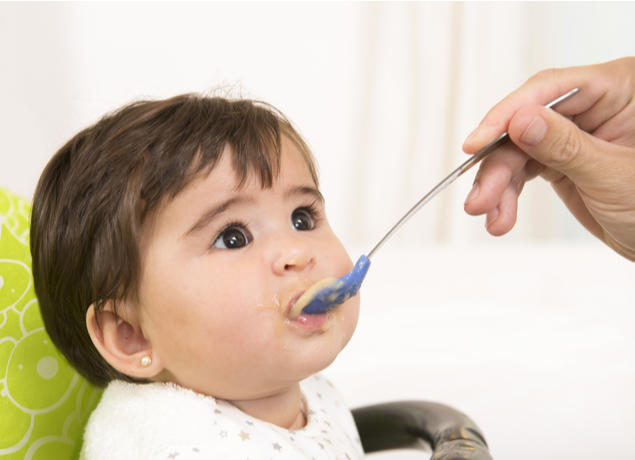Introducing certain allergens into a baby’s diet early is safe and may help lower the risk of those food allergies.
Shifting Advice on Early Introduction
In the U.S., 1 in 13 children have food allergy. The Centers for Disease Control & Prevention report that between 1997 and 2011, the prevalence of food allergy in U.S. children increased by 50 percent. During that time, the American Academy of Pediatrics recommended that parents delay the introduction of top food allergens to children at high risk for food allergy. Unfortunately, delayed introduction was not well-grounded in scientific evidence. We now know that the early introduction of a wide variety of foods is recommended, and may help lower the risk of developing food allergies. Consult with your pediatrician or allergist to learn more about early allergen introduction.

LEAP Study Results Support Introducing Peanut Foods Early
Peanut allergy is now the nation’s most common childhood food allergy, affecting 1.6 million U.S. children. The far-reaching results of the LEAP study, a groundbreaking study supported by FARE, show how parents, caregivers and health care providers can fight this epidemic and prevent many cases of peanut allergy.
Learn More

New Guidelines for Peanut Introduction
Following the introduction of the LEAP study results in 2015, guidelines endorsing the early introduction of peanut food to infants were issued by the American Academy of Pediatrics and the National Institute of Allergy and Infectious Diseases (NIAID), part of the National Institutes of Health. Learn how to evaluate your baby's risk for peanut allergy and when to introduce peanut foods into their diet.
Learn More

Early Introduction Can Help Prevent Peanut Allergy
For more tips, expert guidance, and step-by-step support including downloadable handouts, head to FoodAllergyPrevention.org.
Learn More

What About Other Allergens Beyond Peanut?
The American Academy of Pediatrics recommends exposing babies early to a wide variety of healthy foods. Early introduction of top allergens other than peanut has not yet shown the same clear-cut benefit to lower food allergy risk, but evidence is building that early introduction of egg may prevent at least some high-risk babies from developing egg allergy.


